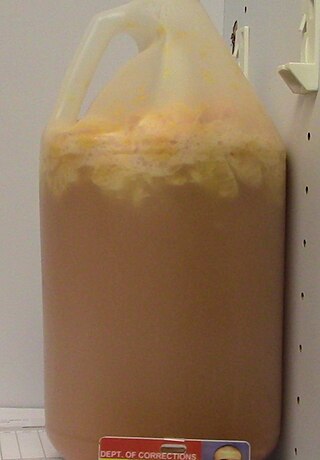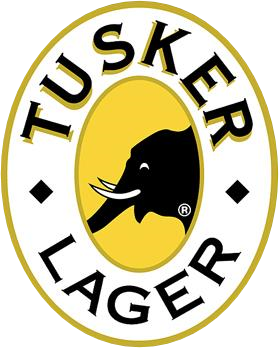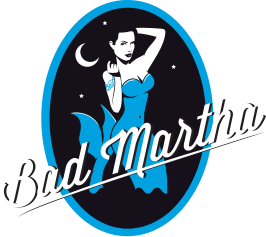
Beer is an alcoholic beverage produced by the brewing and fermentation of starches from cereal grain—most commonly malted barley, although wheat, maize (corn), rice, and oats are also used. The grain is mashed to convert starch in the grain to sugars, which dissolve in water to form wort. Fermentation of the wort by yeast produces ethanol and carbonation in the beer. Beer is one of the oldest alcoholic drinks in the world, the most widely consumed, and the third most popular drink after water and tea. Most modern beer is brewed with hops, which add bitterness and other flavours and act as a natural preservative and stabilising agent. Other flavouring agents, such as gruit, herbs, or fruits, may be included or used instead of hops. In commercial brewing, natural carbonation is often replaced with forced carbonation.

Moosehead Breweries Limited is Canada's oldest independent brewery, located in Saint John, New Brunswick. The brewery was founded in 1867 and is still privately owned and operated by the Oland family. The company is now in the sixth generation of family ownership.

Pruno, also known as prison hooch or prison wine, is a term used in the United States to describe an improvised alcoholic beverage. It is variously made from apples, oranges, fruit cocktail, fruit juices, hard candy, sugar, high fructose syrup, and possibly other ingredients, including crumbled bread. Bread is incorrectly thought to contain yeast for the pruno to ferment. Pruno originated in US prisons, where it can be produced with the limited selection of equipment and ingredients available to inmates. It can be made using only a plastic bag, hot running water, and a towel or sock to conceal the pulp during fermentation. The end result has been described as a "bile-flavored wine cooler". Depending on the time spent fermenting, the sugar content, and the quality of the ingredients and preparation, pruno's alcohol content by volume can range from as low as 2% to as high as 14%.

Taiwan Beer is a brand of mass market beer brewed by the Taiwan Tobacco and Liquor Corporation (TTL). The brand is an icon of Taiwanese culture and is applied to the best-selling beer in the country.
Unibroue is a brewery in Chambly, Quebec, Canada, that was started by Serge Racine and Quebec native André Dion. The company was purchased by Sleeman Breweries Ltd. in 2004, which was itself taken over by Sapporo in 2006.

Fuller's Brewery in Chiswick, west London, England, is the former brewing division of Fuller, Smith & Turner PLC. It was a family-run business from its foundation in 1845 until 2019, when it was sold to the Japanese international beverage giant Asahi.

KEO is a Cypriot beer. It is a light straw-colored lager with a thick head, and is sometimes compared to a pilsner in taste. The name KEO is the beer producer's corporate acronym of Κυπριακή Εταιρία Οίνων.
A wine competition is an organized event in which trained judges or consumers competitively rate different vintages, categories, and/or brands of wine. Wine competitions generally use blind tasting of wine to prevent bias by the judges.

Bundaberg Brewed Drinks Pty Ltd is an Australian family-owned business that brews non-alcoholic beverages. Based in Bundaberg, Queensland, the company exports to over 60 countries across the globe and is most known for ginger beer and other carbonated beverages.
The International Wine & Spirit Competition is an annual wine and spirit competition founded in 1969 by the German/British oenologist Anton Massel. Each year the competition receives entries from over 90 countries worldwide. The awards given by the competition are considered as high honours in the industry. The judging occurs annually, in London. Only brands that pay the entry fee are judged, and two or four bottles of each entry must be supplied, depending on the category entered.
The German Agricultural Society, commonly known as DLG, is an international non-profit organisation for agricultural industry in Germany. DLG was founded in 1885 by Max Eyth, has over 23,000 members as of 2011 and is headquartered in Frankfurt am Main. Its main purpose is to promote technical progress and scientific advances in the food and agricultural industry, including setting standards.

Skol is a lager that was brewed originally by Ind Coope, at Alloa, Scotland, as Graham's Golden Lager. In 1958, the name was changed to Graham's Skol to give a Scandinavian impression. The name was later revised to just Skol.

Tusker is a beer brand owned by East African Breweries, with over 700,000 hectolitres being sold in Kenya per year. It is also the largest African beer brand in the Diageo group. It is a 4.2% ABV pale lager. The beer's slogan "Bia yangu, Nchi yangu" means "My beer, My country" in Kiswahili.
The Superior Taste Award is an annual non-competitive prize open to any consumer food or drink product, subject to payment of an entry fee of Euro 750-1650.
The San Francisco World Spirits Competition was founded in 2001 by Anthony Dias Blue as an off-shoot of the San Francisco International Wine Competition. It assesses hundreds of entrants annually with tastings involving panels of expert judges selected each year from the spirits industry including mixologists, spirits buyers, and media from across the United States. Producers must submit their product for the competition and pay a fee for its evaluation. Not all entries are given awards but most receive a bronze, silver, or gold award from the tasting panel. The fact that most entrants receive an award likely involves some degree of self-selection, as the spirits producers choose whether to enter each of their brands in the competition and pay to receive a rating. Those entrants that are given a unanimous gold medal by the panel are given the distinction of a "double-gold" medal. Additionally, a "best in show" designation is awarded in each main category of spirits.
With a growing number of offerings, such as those produced by an increasing number of microdistilleries, various mechanisms have arisen to provide reviews and opinions of individual varieties of spirits. These events generally use expert panels and blind tastings within specific categories to provide opinions and ratings.
Monde Selection is an annual non-competitive award open to food, drinks, and cosmetics products, created in 1961. It is run by the commercial company, International Institute for Quality Selections, Brussels, Belgium. Consumer products are tasted and tested in order to grant them a quality label awarded by the "International Quality Institute".
The Los Angeles International Competitions event focuses on the wine, spirits, beer and olive oil industries. Distributors and makers in each industry submit entries to be judged by a panel of experts.

Dragonmead is a U.S. microbrewery, meadery and brewpub founded by Earl Scherbarth, Larry Channell, and Bill Wrobel in January 1997. The small brewery produces many varieties of beer, wine, and mead, and has received awards including gold medals at the World Beer Cup.

Bad Martha Farmer’s Brewery is an American microbrewery based on Martha’s Vineyard and founded in 2013 by Jonathan Blum, the sole owner of Bad Martha Farmer’s Brewery with locations in Edgartown, Martha’s Vineyard and Falmouth, MA.










